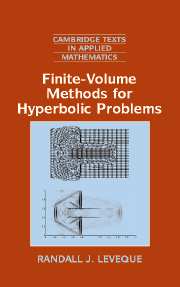Preface
Published online by Cambridge University Press: 05 September 2012
Summary
Hyperbolic partial differential equations arise in a broad spectrum of disciplines where wave motion or advective transport is important: gas dynamics, acoustics, elastodynamics, optics, geophysics, and biomechanics, to name but a few. This book is intended to serve as an introduction to both the theory and the practical use of high-resolution finite volume methods for hyperbolic problems. These methods have proved to be extremely useful in modeling a broad set of phenomena, and I believe that there is need for a book introducing them in a general framework that is accessible to students and researchers in many different disciplines.
Historically, many of the fundamental ideas were first developed for the special case of compressible gas dynamics (the Euler equations), for applications in aerodynamics, astrophysics, detonation waves, and related fields where shock waves arise. The study of simpler equations such as the advection equation, Burgers’ equation, and the shallow water equations has played an important role in the development of these methods, but often only as model problems, the ultimate goal being application to the Euler equations. This orientation is still reflected in many of the texts on these methods. Of course the Euler equations remain an extremely important application, and are presented and studied in this book, but there are also many other applications where challenging problems can be successfully tackled by understanding the basic ideas of high-resolution finite volume methods. Often it is not necessary to understand the Euler equations in order to do so, and the complexity and peculiarities of this particular system may obscure the more basic ideas.
- Type
- Chapter
- Information
- Finite Volume Methods for Hyperbolic Problems , pp. xvii - xxPublisher: Cambridge University PressPrint publication year: 2002

